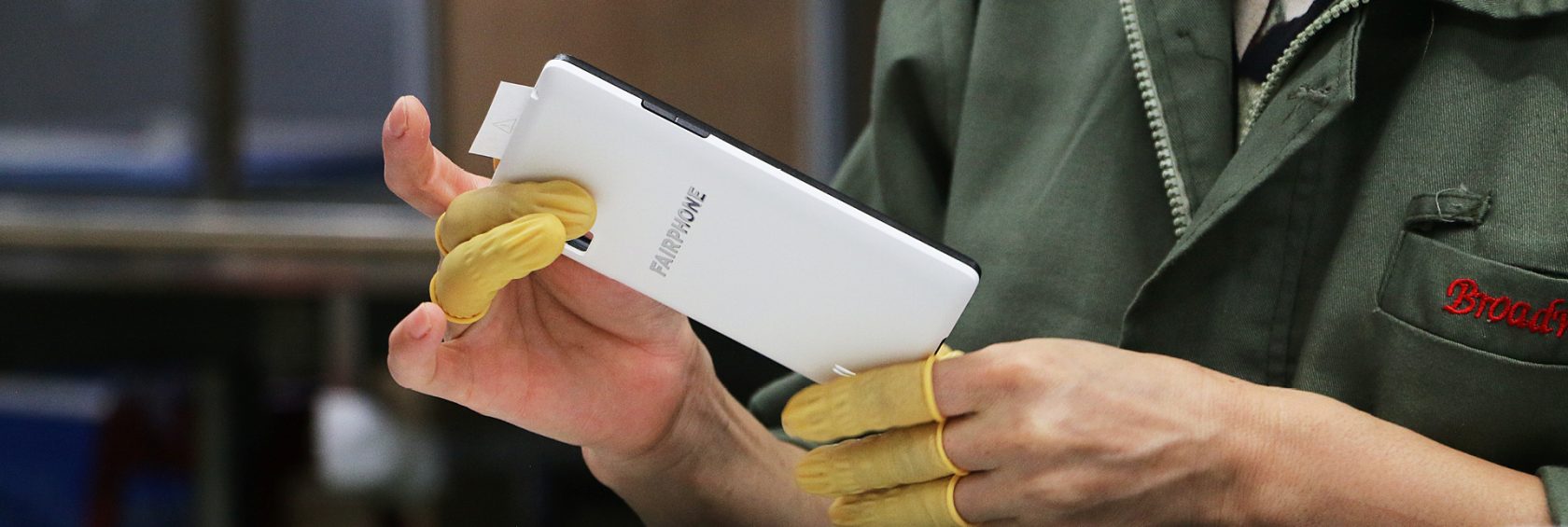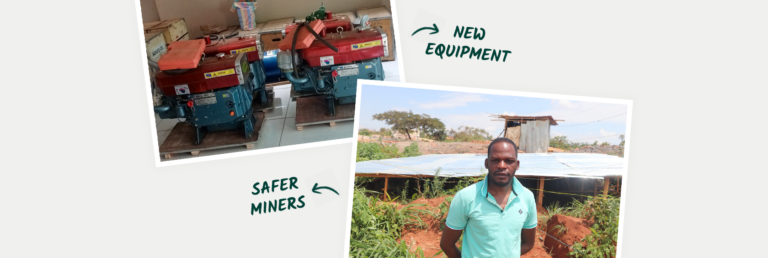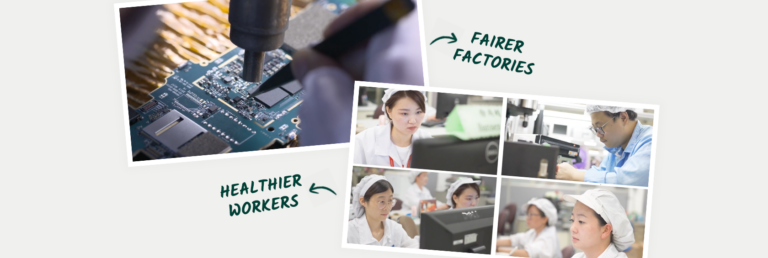Creating a better working environment with Broadway
Late last year, we introduced you to Broadway – the manufacturer making the slim cases for the Fairphone 2. After creating a shortlist of potential suppliers, we decided to work with Broadway due to their capabilities and social and environmental performance, plus their keen interest in collaborating on a variety of activities to improve working conditions.
This week, Broadway is producing another batch of the Fairphone 2 covers. So we thought this would be a great opportunity to tell you more about the progress we’ve made together so far.
Clear goals, created together
At the start of our partnership, we worked closely with Broadway to define two high-level goals for improvements: 1) strengthening employee/manager dialogue to improve working conditions and 2) reducing the use of hazardous chemicals during the production process.
To develop and implement the various activities related to each goal, we worked together with Broadway’s management team, labor issues expert Dimitri Kessler of the Economics Rights Institute (ERI), independent third-party chemical and health assessor Golder, our own value chain team, and of course the workers themselves.
Let’s look at what’s been achieved one goal at a time.
Goal 1: Strengthening employee/manager dialogue to improve working conditions
The first step to making things better is understanding the current situation. So we started by assessing the overall working conditions and reviewing the existing systems for worker/management dialogue and worker representation. We also conducted an employee satisfaction survey and held workshops to gain insight into the employees’ and management’s main concerns and suggestions for improvement.
During this information-gathering phase, we learned that employees were generally positive about working for Broadway – giving the company a 7 out of 10 for worker satisfaction. When asked what could be improved, they mentioned food service, increased benefits/remuneration and improved communication with colleagues and supervisors. We also discovered that there was already a group of worker representatives in place, but both the management and employees felt that it was not working optimally.
With these new insights, we’ve been able to start making concrete progress. Here are a few ways we’ve improved worker/management dialogue and representation since November last year:
- Offered training sessions to employee representatives and management on constructive communication and problem solving, including tools and methods for collecting opinions from the workforce.
- Organized new elections to expand the group of worker representatives to 34 people and better reflect the actual composition of the workforce (e.g., office workers vs. assembly workers).
- Made the election process more transparent by publishing a list of candidates before the elections and giving candidates better opportunities to introduce themselves and their ideas.
The more transparent system and improved composition of the worker representative group has made it easier for workers to express their ideas and needs to their representatives, as well as receive feedback on their suggestions.
For example, based on the insights from the employee satisfaction survey, the representatives have created a quality committee to review and improve the food service offered. Broadway has opened a second canteen with food provided by a different caterer to increase competition and give workers more choice. In addition, hygiene has been improved by renewing all cutlery and dishes as well as introducing better cleaning tools.
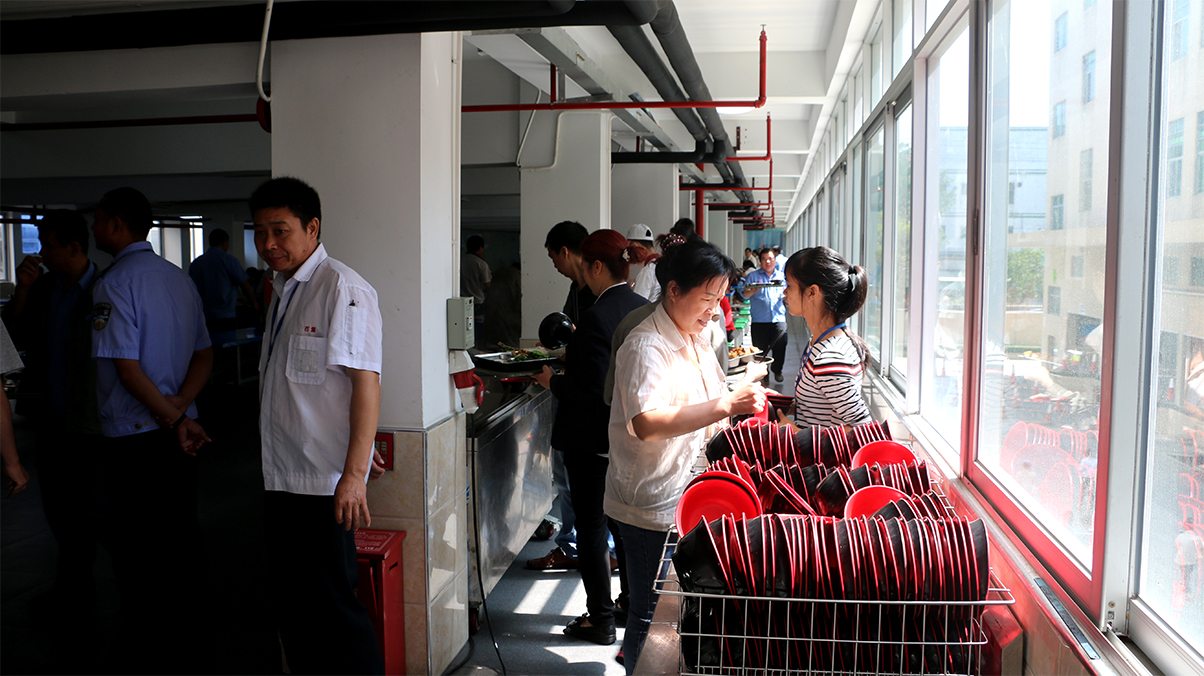
Broadway employees at the second canteen in their facilities, which was recently opened to provide more options for workers (October 2017).
Goal 2: Reducing the use of hazardous chemicals during production
Our second shared goal concerned improving health and safety – specifically reducing the exposure to harmful chemicals during the production process. Independent third-party assessor Golder performed an Industrial Health Assessment at Broadway in April 2017.
The assessment process included taking 20 samples at work stations where employees could potentially be exposed to hazardous chemicals. Following standardized protocols, a measuring device was held near an employee’s face for 15 minutes while they performed their regular tasks. The collected samples were then sent to a lab for analysis.
The analysis concluded that 18 of the 20 samples contained no trace of hazardous chemicals. Two samples did show minor exposure, but well within the limits of what is considered safe. Specifically, one of these samples showed 11.3 mg/m3 exposure to n-hexane (the strictest standards consider exposure up to 100 mg/m3 safe). Regardless, as a result of the assessment, Broadway immediately replaced the n-hexane solution that was used, eliminating the risk of exposure to this chemical.
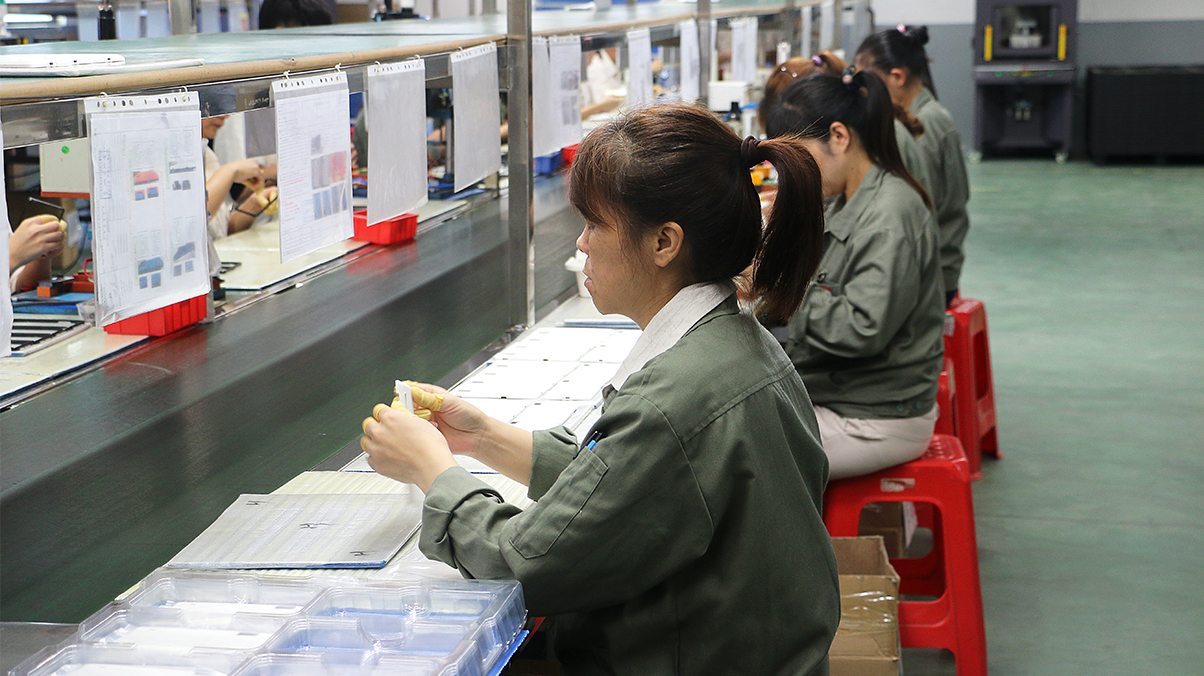
Quality check of the Fairphone 2 back covers at the start of the final assembly line (October 2017).
This assessment also highlighted the importance of having a complete and accurate inventory of all the chemicals involved in the production process.
Since the assessment, Broadway has introduced a new format for keeping track of all the information about the chemicals they use.
Next steps for ongoing improvements
So far, Broadway showed to be receptive and willing to successfully take measures and we are pleased to see these developments and improvements setting of. To us, it clearly demonstrates that partnerships within the electronics supply chain can offer concrete results that go beyond great products.
Going forward, there is more we would like to accomplish together, from worker satisfaction to health and safety. For example, in the ERI’s dialogue sessions with management it was discussed that improving benefits and remuneration could improve employee satisfaction and retention. As a one-off, management has given the green light for a holiday premium of 100 yuan. However, to align different views how to redesign the existing remuneration processes in a more systematic way is easier said than done. Further dialogue between the worker representatives and management may lead to other ideas for improvements to benefit both the workers and the company.
Going further, we’ll continue to gather insights and collaborate, one step at a time. And we’ll be sure to keep you informed as we follow this path towards improvement.
